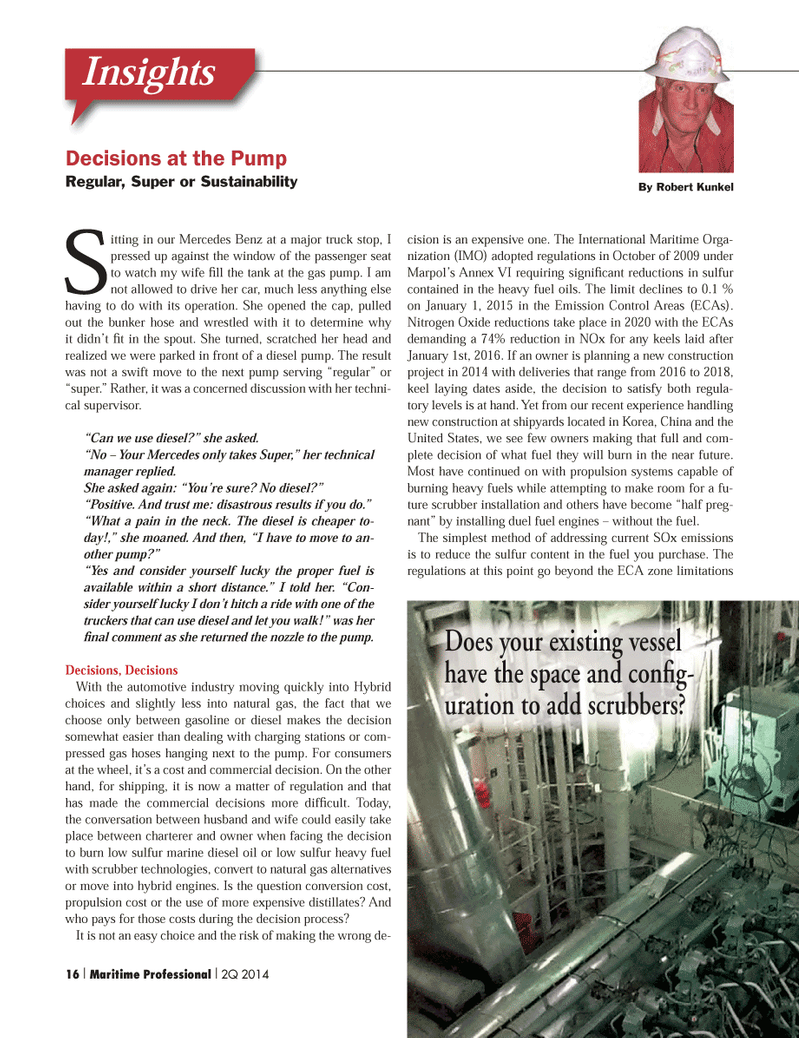
Page 16: of Maritime Logistics Professional Magazine (Q2 2014)
Maritime Risk & Shipping Finance
Read this page in Pdf, Flash or Html5 edition of Q2 2014 Maritime Logistics Professional Magazine
Insights
Decisions at the Pump
Regular, Super or Sustainability
S itting in our Mercedes Benz at a major truck stop, I pressed up against the window of the passenger seat to watch my wife fi ll the tank at the gas pump. I am not allowed to drive her car, much less anything else having to do with its operation. She opened the cap, pulled out the bunker hose and wrestled with it to determine why it didn’t fi t in the spout. She turned, scratched her head and realized we were parked in front of a diesel pump. The result was not a swift move to the next pump serving “regular” or “super.” Rather, it was a concerned discussion with her techni- cal supervisor. “Can we use diesel?” she asked. “No – Your Mercedes only takes Super,” her technical manager replied.
She asked again: “You’re sure? No diesel?” “Positive. And trust me: disastrous results if you do.” “What a pain in the neck. The diesel is cheaper to- day!,” she moaned. And then, “I have to move to an- other pump?” “Yes and consider yourself lucky the proper fuel is available within a short distance.” I told her. “Con- sider yourself lucky I don’t hitch a ride with one of the truckers that can use diesel and let you walk!” was her fi nal comment as she returned the nozzle to the pump.
Decisions, Decisions
With the automotive industry moving quickly into Hybrid choices and slightly less into natural gas, the fact that we choose only between gasoline or diesel makes the decision somewhat easier than dealing with charging stations or com- pressed gas hoses hanging next to the pump. For consumers at the wheel, it’s a cost and commercial decision. On the other hand, for shipping, it is now a matter of regulation and that has made the commercial decisions more diffi cult. Today, the conversation between husband and wife could easily take place between charterer and owner when facing the decision to burn low sulfur marine diesel oil or low sulfur heavy fuel with scrubber technologies, convert to natural gas alternatives or move into hybrid engines. Is the question conversion cost, propulsion cost or the use of more expensive distillates? And who pays for those costs during the decision process?
It is not an easy choice and the risk of making the wrong de- cision is an expensive one. The International Maritime Orga- nization (IMO) adopted regulations in October of 2009 under
Marpol’s Annex VI requiring signifi cant reductions in sulfur contained in the heavy fuel oils. The limit declines to 0.1 % on January 1, 2015 in the Emission Control Areas (ECAs).
Nitrogen Oxide reductions take place in 2020 with the ECAs demanding a 74% reduction in NOx for any keels laid after
January 1st, 2016. If an owner is planning a new construction project in 2014 with deliveries that range from 2016 to 2018, keel laying dates aside, the decision to satisfy both regula- tory levels is at hand. Yet from our recent experience handling new construction at shipyards located in Korea, China and the
United States, we see few owners making that full and com- plete decision of what fuel they will burn in the near future.
Most have continued on with propulsion systems capable of burning heavy fuels while attempting to make room for a fu- ture scrubber installation and others have become “half preg- nant” by installing duel fuel engines – without the fuel.
The simplest method of addressing current SOx emissions is to reduce the sulfur content in the fuel you purchase. The regulations at this point go beyond the ECA zone limitations
By Robert Kunkel
Does your existing vessel have the space and confi g- uration to add scrubbers? 16 I Maritime Professional I 2Q 2014 1-17 Q2 MP2014.indd 16 5/16/2014 2:49:00 PM

 15
15

 17
17
